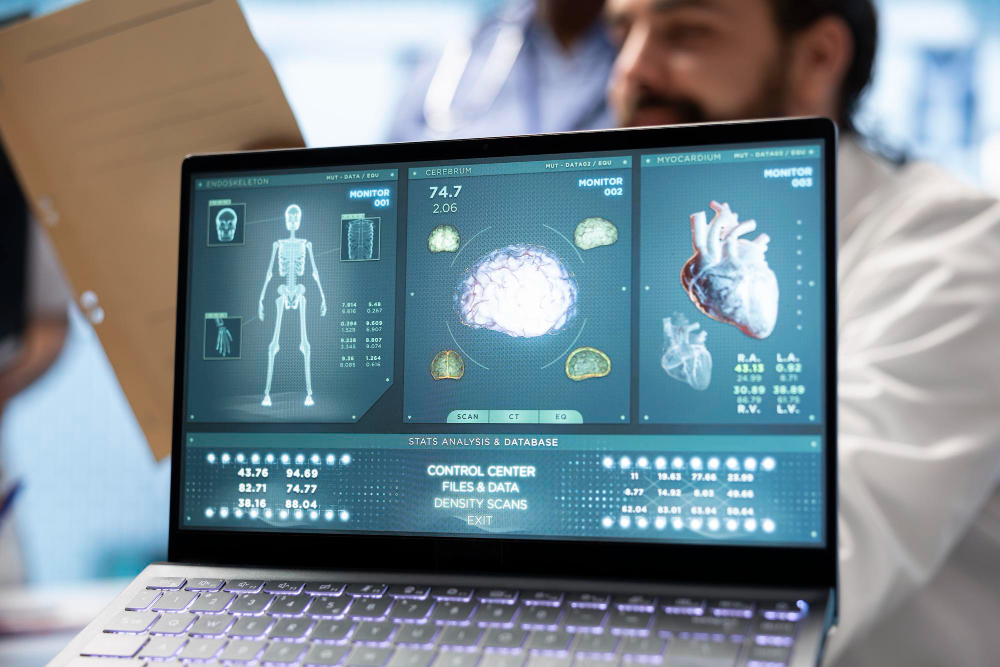Generative AI refers to the use of artificial intelligence algorithms to generate new content. In healthcare marketing, it is employed to create personalized messages and materials that cater to the specific needs and preferences of patients. By leveraging AI, healthcare providers can deliver more relevant and engaging content, ultimately improving patient satisfaction and outcomes.
The Basics of Generative AI
Generative AI involves complex algorithms capable of producing unique and tailored content. Unlike traditional AI, which may focus on data analysis and pattern recognition, generative AI actively creates new outputs. In the context of healthcare marketing, this means generating messages that are not only informative but also directly aligned with individual patient needs and histories.
Personalization in Marketing
Personalization has become a buzzword in marketing, but its application in healthcare is revolutionary. Patients today expect communications that speak directly to them rather than generic messages. With generative AI, healthcare providers can move beyond mere segmentation based on age or gender and dive into detailed personal insights, crafting messages that align with personal health journeys.
AI’s Role in Patient Satisfaction
Patient satisfaction is a crucial metric for healthcare providers, influencing everything from reputation to financial performance. By using AI to tailor communications, providers can enhance the patient experience. Personalized messages that resonate with patients’ specific conditions or treatment plans can lead to better adherence, more engagement, and ultimately, higher satisfaction levels.
AI-Powered Patient Communication

One of the key benefits of generative AI in healthcare marketing is its ability to facilitate personalized patient communication. Traditional marketing methods often rely on generic messages that may not resonate with individual patients. However, AI-powered tools can analyze patient data, including demographics, medical history, and preferences, to create tailored messages that address specific concerns and interests. This personalized approach fosters a deeper connection between healthcare providers and patients, leading to improved engagement and loyalty.
Analyzing Patient Data
AI tools excel at sifting through vast amounts of patient data to identify patterns and preferences. By examining factors such as past medical history, lifestyle choices, and even social determinants of health, AI can create a comprehensive profile of each patient. This data-driven approach ensures that communications are not only relevant but also timely, addressing immediate concerns or upcoming healthcare needs.
Crafting Tailored Messages
Once AI has gathered sufficient insights, it can craft messages that speak directly to the patient’s circumstances. This could involve reminders for medication, updates on new treatments relevant to their conditions, or health tips aligned with their lifestyle. The ability to receive targeted advice or reminders can significantly improve a patient’s commitment to their health regimen.
Building Patient Trust
Trust is a cornerstone of the patient-provider relationship. Personalized communication can enhance this trust by showing patients that their healthcare provider understands and cares about their unique journey. When patients receive messages that reflect their personal health status and concerns, it validates their relationship with the provider, fostering loyalty and long-term engagement.
AI Tools for Healthcare Marketing

AI tools have become indispensable in healthcare marketing, enabling providers to streamline their efforts and achieve better results. These tools can automate various marketing tasks, such as content creation, social media management, and email campaigns. By harnessing AI technologies, healthcare marketers can optimize their strategies, save time, and focus on delivering high-quality patient care.
Automating Content Creation
AI-driven content creation platforms can generate engaging articles, blog posts, and social media content. These platforms use natural language processing algorithms to ensure that the content aligns with patients’ interests and preferences. This automation allows healthcare marketers to maintain a steady stream of content without the constant need for human intervention, freeing up resources for more strategic tasks.
Enhancing Social Media Engagement
In the digital age, social media is a vital channel for reaching patients. AI tools can analyze social media trends and patient interactions to determine the most effective ways to engage audiences. By identifying the types of content that resonate most with followers, marketers can craft campaigns that maximize engagement and extend reach.
Streamlining Email Campaigns
Email remains a powerful tool in healthcare marketing, but generic campaigns often fall flat. AI can segment patient lists based on detailed data insights and deliver personalized email content. This includes customizing subject lines, tailoring messages to individual health concerns, and timing emails for optimal engagement. The result is higher open rates and more meaningful interactions with patients.
Chatbots for Real-Time Assistance
AI-powered chatbots offer real-time assistance to patients, answering their queries and providing relevant information. These virtual assistants can handle routine inquiries, allowing healthcare staff to focus on more complex tasks. Chatbots can be programmed to recognize frequently asked questions and deliver instant responses, ensuring that patients receive timely support and information.
Predictive Analytics for Proactive Care
Predictive analytics is another key area where AI can transform healthcare marketing. By analyzing patient data, AI algorithms can identify patterns and predict future needs. This enables healthcare providers to anticipate patient requirements and deliver proactive care. Predictive insights can be used to develop targeted interventions, such as preventive health campaigns, that address potential health issues before they become critical.
The Role of AI in Personalized Healthcare Content
Generative AI plays a crucial role in creating personalized healthcare content that resonates with patients. By analyzing patient data, AI algorithms can identify individual needs and preferences, allowing healthcare providers to deliver tailored content that addresses specific concerns. This level of personalization enhances patient engagement and empowers individuals to make informed decisions about their health.
Crafting Relevant Health Information
The ability to deliver health information that is relevant to a patient’s specific condition or lifestyle is a game-changer. AI can generate content that addresses individual health questions, providing information that is easy to understand and actionable. This not only aids in patient education but also encourages patients to take proactive steps in managing their health.
Empowering Patients Through Knowledge
Knowledge is power, especially in healthcare. Personalized content can empower patients by providing them with the information they need to understand their conditions and treatment options. AI can tailor educational materials to match the patient’s literacy level, cultural background, and learning preferences, ensuring that every patient can engage with their health information effectively.
Encouraging Health Literacy
Health literacy is a significant barrier in healthcare, but personalized AI content can help bridge this gap. By delivering information that is clear, relevant, and easy to comprehend, AI can improve patients’ understanding of their health. Better health literacy leads to more informed decision-making, improved adherence to treatment plans, and ultimately, better health outcomes.
Real-World Examples of AI in Healthcare Marketing
Several healthcare organizations have already embraced generative AI to enhance their marketing efforts and improve patient engagement. Here are a few notable examples:
Cleveland Clinic’s AI Chatbots
The Cleveland Clinic utilizes AI-powered chatbots to provide patients with instant access to information and support. These chatbots assist patients in scheduling appointments, answering common queries, and providing personalized health recommendations. By integrating AI chatbots, Cleveland Clinic has improved patient access to care and streamlined administrative processes, freeing up staff for more complex patient interactions.
Mayo Clinic’s Personalized Content
Mayo Clinic employs AI algorithms to analyze patient data and deliver personalized content through its website and mobile app. By tailoring information to individual patients, Mayo Clinic ensures that patients receive relevant updates and educational materials. This approach not only enhances patient satisfaction but also encourages patients to engage more actively with their health care.
IBM Watson Health’s Targeted Campaigns
IBM Watson Health leverages AI technologies to create personalized marketing campaigns for healthcare providers. By analyzing patient data and preferences, Watson Health helps organizations deliver targeted messages that resonate with their audiences. These campaigns have been shown to improve patient engagement and retention, demonstrating the power of AI in healthcare marketing.
Overcoming Challenges in AI-Powered Healthcare Marketing
While generative AI offers immense potential for healthcare marketing, there are challenges that need to be addressed. Privacy and data security concerns, for example, must be carefully managed to ensure patient information is protected. Additionally, healthcare organizations need to invest in robust infrastructure and resources to effectively implement AI technologies.
Ensuring Data Privacy and Security
The use of AI in healthcare marketing requires the collection and analysis of patient data. It is crucial for healthcare providers to implement stringent security measures to protect patient information. Compliance with regulations such as the Health Insurance Portability and Accountability Act (HIPAA) is essential to maintain patient trust and confidentiality. Providers must invest in secure data storage solutions and regular audits to ensure that patient data is managed safely.
Building a Robust AI Infrastructure
Implementing AI technologies in healthcare marketing requires a solid infrastructure and skilled workforce. Healthcare organizations need to invest in technology infrastructure, data management systems, and training programs to ensure successful adoption and utilization of AI tools. Collaborating with technology partners and industry experts can also help overcome implementation challenges. By building a strong foundation, healthcare providers can maximize the benefits of AI while minimizing potential risks.
Addressing Ethical Considerations
The use of AI in healthcare marketing raises important ethical considerations. Providers must ensure that AI-driven communications are not only accurate but also ethical and non-discriminatory. Transparency in how patient data is used and clear communication about AI’s role in healthcare marketing are essential. By addressing these ethical considerations, healthcare providers can build trust with patients and ensure that AI is used responsibly and effectively.
Conclusion
Generative AI is revolutionizing patient engagement in healthcare marketing by delivering personalized content and enhancing communication between healthcare providers and patients. By leveraging AI-powered tools, healthcare organizations can streamline their marketing efforts, improve patient experiences, and ultimately drive better health outcomes. While challenges exist, the potential benefits of generative AI in healthcare marketing are significant. As the healthcare industry continues to evolve, embracing AI technologies will be crucial for staying competitive and delivering exceptional patient care.